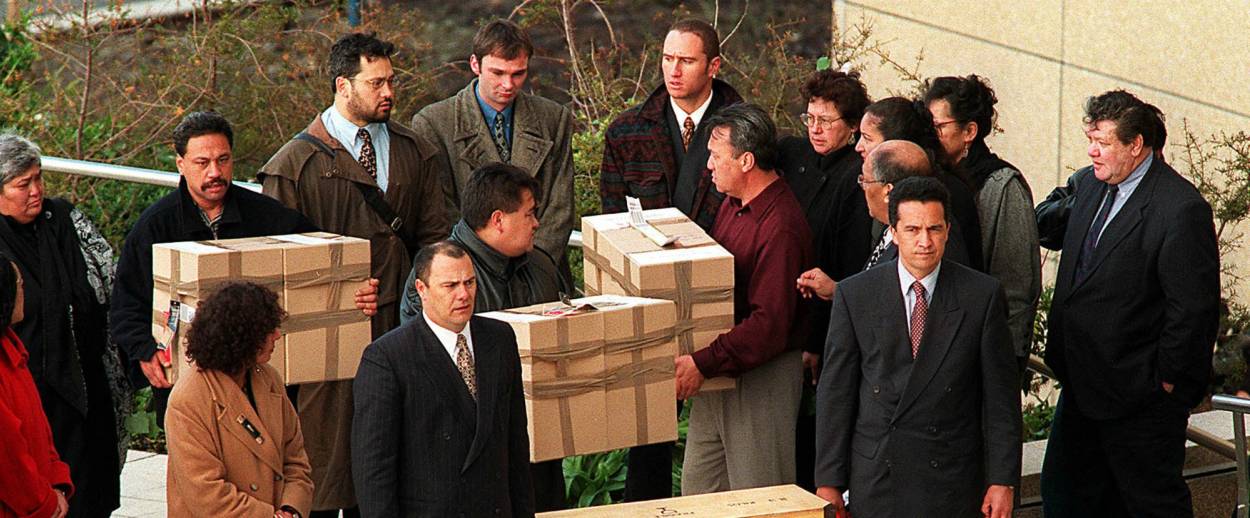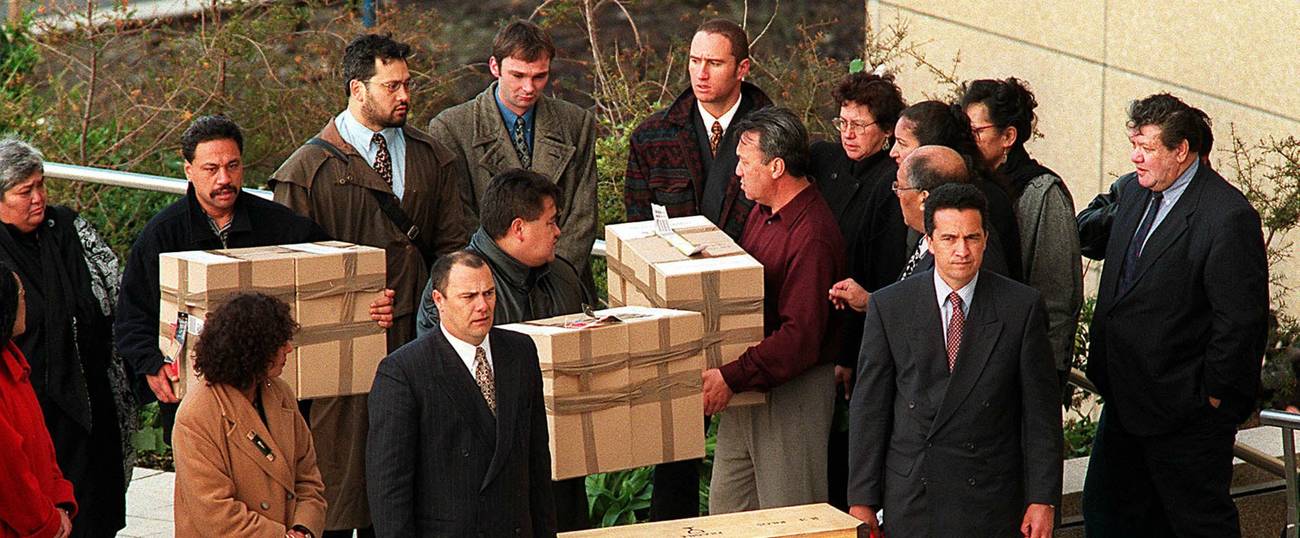New Zealand’s Settler Problem
A Colonialist state founded on the theft of Maori land blames Israel for its own crimes




Last Friday, New Zealand introduced a resolution in the UN Security Council that pronounced “settlements in the Palestinian territory occupied since 1967” to be illegal, a definition that includes the Western Wall, the Jewish Quarter of Jerusalem, and other historically-recognized parts of the Jewish State. While the United States made headlines by abstaining from the 14-0 vote, less attention was paid to the resolution’s sponsor—and to the dark history that lies behind a small South Pacific nation’s passionate feelings about a property dispute in the Middle East.
New Zealanders are no strangers to settlements—or to the cavalier denial of the rights of an indigenous people in their historic homeland. Coincidentally or not, this December marks the 153rd anniversary of The New Zealand Settlements Act, which shows that the denial of indigenous rights, and the deliberate destruction of a two-state solution in favor of an illegal land grab, are the bedrock on which the modern state of New Zealand was founded. Given that history, and the current realities of New Zealand’s treatment of its indigenous Maori population, the country’s steering of a UN Security Council resolution pronouncing the Jewish connection to our historic homeland to be illegal passes well into the territory of historical denialism.
The story of New Zealand’s continuing illegal occupation of Maori land is best told by numbers: in 1831, there were fewer than 1,000 Europeans living in New Zealand, a population dwarfed by that of the local Maori tribes. By 1881, that number had mushroomed to 500,000, largely the result of British policy that shipped off settlers to the new continent and encouraged them to stay. It goes without saying that these Europeans had neither historical attachment nor any legal claim to the land. While the Maoris were happy at first to trade with the newcomers, they eventually realized that the Pākehā, their name for the white settlers, would not be satisfied until they seized all of the land and eliminated the Maori way of life. Wars broke out, and treaties were signed, which finally divided sovereignty in the land between the European colonialists and the aboriginal inhabitants.
But dividing the land in half between the Maori and the European colonialists wasn’t enough to satisfy the ancestors of today’s New Zealanders. In 1863, the colonial government ordered all Maori to lay down their arms. Those who did not, according to the newly passed land confiscation clauses contained in the New Zealand Settlements Act, would “forfeit the right to possession of their lands.” Four million acres of Maori lands were subsequently seized by the government in Wellington without the slightest pretense of due process and handed out as prizes to European colonialists, and Maori sovereignty in their ancestral homeland was effectively eliminated.
If you wish to study the effect of New Zealand’s particularly crass brand of colonialism on the Maori population, you needn’t do much more than observe their descendants today: According to a UN report earlier this year, for example, 300,000 Maori children—a whopping one-third of New Zealand’s child population—now live under the poverty line, a rise of 45,000 in just one year. Nearly half of Maori youth drop out of secondary school. Health disparities are rampant as well: The cancer gap, for example, between Maori and other New Zealanders is higher than it is among any other indigenous population in Western countries, especially with cancers easily preventable by decent medical care, which Maoris are denied by a public health policy that verges on the genocidal.
With their UN vote, then, New Zealand has accurately identified the problem of what happens when an occupying force illegally and wantonly deprives a local population of its inalienable right for self-determination in its historic homeland. For some strange reason, though, New Zealand has chosen to project its own historical and moral failings on the aboriginal population of the Jewish State, while continuing to ignore the effects of its historical and well-documented crimes at home.
Because Israel prides itself as being a light unto the nations, it is not too late for Jerusalem to help correct a historical injustice, and to help its friends in Wellington heal. Israeli Jews know all about struggling to maintain connections to a historical homeland in the face of international indifference and regional hostilities, and the long, hard slog that it takes to form a truly effective national liberation movement that is capable of attaining national self-awareness and gaining international support for its own political autonomy.
The suffering of the Maori at the hands of European colonialists is not a joke. As a Zionist, it is hard to escape the sense that Jews have long—and mistakenly—downgraded our association with other indigenous national groups like the Maori in New Zealand, Tibetans in China, Catalans in Spain, Scots in Great Britain, the Native Peoples of Canada, Georgians and Ukrainians held captive by Russia, and many others, in favor of what we imagined was our seat at the grown-up table. In doing so, the State of Israel may have bowed to diplomatic necessity, but it has also diminished the strength of our historical and legal claim to our national homeland, guaranteed to us by the San Remo Conference, the Treaty of Sevres, and a League of Nations Mandate, but is now under sustained attack at the UN. Indigenous peoples whose histories and attachments to their own land are not unlike our own might well benefit from the technology, organizational capacity and experience of the Jewish State, which may serve as a model for their own future moments of national liberation. As the ultimate indigenous survivors, Israelis should be proud to celebrate our aboriginal rights in our national homeland, and help others to do the same.
Given the brute ugliness of its colonial past, New Zealand seems like an excellent place for the diplomats in Israel’s Foreign Ministry to try out a new model that puts solidarity with other indigenous peoples on an equal footing with traditional government-to-government relations. Israel might start by sending some of the money it cut from the aid budget to Senegal—which joined New Zealand in sponsoring the anti-Israel vote at the UN—to help the impoverished Maoris build the capacity to organize themselves politically against centuries of dispossession. In doing so, Israeli legal experts and others will hopefully help the Maori to erect a framework for negotiations that addresses the continuing European occupation of 4 million acres of Maori land that was seized by force in 1863, in defiance of legal treaty obligations. Israel might also do well to receive a Maori ambassador alongside the ambassador from Wellington, to represent Maori interests to Jerusalem.
For if the principle of two states for two peoples is good enough for a majority of Israelis to willingly accept, it is surely good enough for New Zealanders, who have already agreed to a division of their own land with the Maori—and then wantonly violated their own legally-binding agreements. Solving the Israeli-Palestinian dispute may have just gotten harder because of New Zealand’s exercise in national self-denial at the UN, but helping New Zealanders address the open sore of their own history is a relatively simple matter of enforcing existing agreements. Surely, this is one place where Jews can stand proudly on the right side of history, while helping to buttress our own legal claims to our homeland, which have been unjustly put in doubt.
Liel Leibovitz is editor-at-large for Tablet Magazine and a host of its weekly culture podcast Unorthodox and daily Talmud podcast Take One. He is the editor of Zionism: The Tablet Guide.